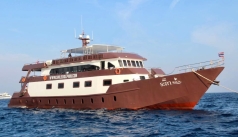Sightseeing & Activities
* What are the best things to do in Phuket?
You can enjoy jet skiing, parasailing, and snorkelling along the west coast's coral reefs. Take a boat trip to Krabi or Phang Nga Bay to explore limestone caves by sea canoe. Try golf, bowling, rifle shooting, or adventure activities like bungee jumping and go-karting.
* Where are the best viewpoints in Phuket?
Head to the hills south of Patong for stunning views of Kata and Karon beaches. Visit Promthep Cape for breathtaking sunsets. The Big Buddha statue offers panoramic island views, and Wat Chalong showcases beautiful Thai temple architecture.
* Are there any nature attractions near Phuket?
Yes, you can visit the Gibbon Sanctuary and Bang Pae Waterfall near the Heroines Monument. The west coast villages of Bang Tao, Surin, and Kamala offer cultural insights into Phuket’s Muslim communities.
Beaches
* Which beach is best for nightlife?
Patong Beach is Phuket’s liveliest spot, with bars, clubs, and water sports. Soi Bangla is the centre of nightlife, closed to traffic at night.
* Where can I find quieter beaches?
Karon Beach (4km long, less crowded), Kata Beach, and Kata Noi are great for relaxation. Nai Harn, Yanui, Kamala, Surin, and Laem Sing offer peaceful alternatives.
* Can I surf in Phuket?
Yes! From May to October, Karon Beach has strong waves ideal for surfing. Check warning flags for safety.
Dining & Nightlife
* Where can I find good restaurants?
Patong offers diverse cuisines, from Thai to Italian, French, and Japanese. Karon and Kata also have excellent beachfront dining options.
* What’s the nightlife like in Phuket?
Bangla Road in Patong has over 200 bars, clubs, and go-go bars. Quieter spots can be found away from the main party areas.
Shopping
* Where should I shop in Phuket?
Patong’s Soi Permpong II & III have maket-style stalls. You can buy Thai silk, tailored suits, pearls, and handicrafts. Phuket Town and the airport road offer antiques and teak wood furniture.
* What unique souvenirs can I buy?
Look for pewter items, gemstones, wood carvings, and Buddha statues. Designer copies are widely available at bargain prices.
Transportation
* How do I get around Phuket?
Tuk-tuks are common but negotiate prices. Renting a scooter or car is flexible for sightseeing. Public buses run between beaches and Phuket Town.
* Are there taxis at the airport?
Yes, metered taxis are available. The ride from Phuket Airport to Patong takes about 45 minutes.
Travel to Phuket
* How do I fly to Phuket?
Direct flights operate from Bangkok, Singapore, Hong Kong, and Kuala Lumpur. From Bangkok, flights take just over an hour.
* Is Phuket safe from Thailand’s southern unrest?
Yes, conflicts are limited to the far south near Malaysia; Phuket remains safe for tourists.
Final Tips
* Best time for whale sharks (diving): March–May
* Combine trips: Visit Phi Phi Islands or Krabi for more adventures

























